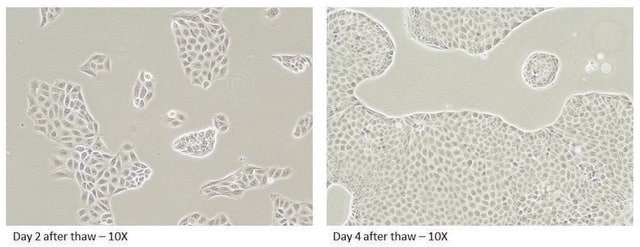MTOX1303
Canine MDR1 Knockout, Human MDR1 Knockin MDCKII Cells
canine kidney (cocker spaniel)
Sinónimos:
MDCKII hMDR1 knockin cells
Iniciar sesiónpara Ver la Fijación de precios por contrato y de la organización
About This Item
UNSPSC Code:
12352207
NACRES:
NA.81
Productos recomendados
product name
Canine MDR1 Knockout, Human MDR1 Knockin MDCKII Cells,
biological source
canine kidney (cocker spaniel)
Quality Level
form
liquid
storage temp.
−196°C
Gene Information
human ... ABCB1(5243)
Application
See technical bulletin for detailed protocols
Features and Benefits
MDCK II - Madin-Darby canine kidney- is a subclone derived from the heterogenous parent line - MDCK (ECACC catalogue no. 85011435) MDCK II cells, which predominate in later passages from MDCK, are reported to display electrical resistance of 100 ohm/cm2. This strain is thought to be derived from the distal tubule or collecting duct of the nephron. The cell line can be used as an experimental model to study the generation and maintenance of cell surface polarity in epithelial cells.
The canine MDR1 (cP-gp) efflux transporter gene has been effectively disrupted in both alleles. There is no expression of the cP-gp. Human MDR1 (P-gp) has been transfected into the MDCKII cell line. Validation studies have shown efflux of standard MDR1 substrates.
Quality
Tested for Mycoplasma, sterility, post-freeze viability, short terminal repeat (STR) analysis for cell line identification.
Legal Information
This product is covered under a consumable purchase agreement for one-time use only. For more information:ADME/Tox Cell Lines LicenseMDCKII subclone was originally isolated by Daniel Louvard, Institut Curie, Paris France.
Disclaimer
RESEARCH USE ONLY. This product is regulated in France when intended to be used for scientific purposes, including for import and export activities (Article L 1211-1 paragraph 2 of the Public Health Code). The purchaser (i.e. enduser) is required to obtain an import authorization from the France Ministry of Research referred in the Article L1245-5-1 II. of Public Health Code. By ordering this product, you are confirming that you have obtained the proper import authorization.
Storage Class
10 - Combustible liquids
wgk_germany
WGK 3
flash_point_f
Not applicable
flash_point_c
Not applicable
Certificados de análisis (COA)
Busque Certificados de análisis (COA) introduciendo el número de lote del producto. Los números de lote se encuentran en la etiqueta del producto después de las palabras «Lot» o «Batch»
¿Ya tiene este producto?
Encuentre la documentación para los productos que ha comprado recientemente en la Biblioteca de documentos.
Stefan Gahbauer et al.
Proceedings of the National Academy of Sciences of the United States of America, 120(2), e2212931120-e2212931120 (2023-01-05)
The nonstructural protein 3 (NSP3) of the severe acute respiratory syndrome-coronavirus-2 (SARS-CoV-2) contains a conserved macrodomain enzyme (Mac1) that is critical for pathogenesis and lethality. While small-molecule inhibitors of Mac1 have great therapeutic potential, at the outset of the COVID-19
D Louvard
Proceedings of the National Academy of Sciences of the United States of America, 77(7), 4132-4136 (1980-07-01)
A dog kidney epithelial cell line (MDCK), grown in monolayer, displayed in vitro an asymmetric localization of surface proteins. Aminopeptidase [alpha-aminoacylpeptide hydrolase (microsomal), EC 3.4.11.2] was found only in the apical face whereas Na+, K+-ATPase (ATP phosphohydrolase, EC 3.6.1.3) was
Shehab Eid et al.
International journal of molecular sciences, 23(23) (2022-12-12)
Several strands of investigation have established that a reduction in the levels of the cellular prion protein (PrPC) is a promising avenue for the treatment of prion diseases. We recently described an indirect approach for reducing PrPC levels that targets
G C Hansson et al.
The EMBO journal, 5(3), 483-489 (1986-03-01)
The glycosphingolipids (GSLs) of two sublines of Madin-Darby canine kidney (MDCK) cells, an epithelial cell line, were characterized by t.l.c., antibody overlay and mass spectrometry. The major characteristic which distinguishes the two MDCK cell strains is their trans-epithelial electrical resistance
S Simon et al.
Biochimica et biophysica acta, 1821(9), 1211-1223 (2012-06-14)
Phospholipids are widely used excipients for pharmaceutical formulations, such as for preparing biphasic systems or to solubilize or encapsulate poorly soluble drugs. The present study investigates a new property of this class of substance: its ability to inhibit the efflux
Nuestro equipo de científicos tiene experiencia en todas las áreas de investigación: Ciencias de la vida, Ciencia de los materiales, Síntesis química, Cromatografía, Analítica y muchas otras.
Póngase en contacto con el Servicio técnico



